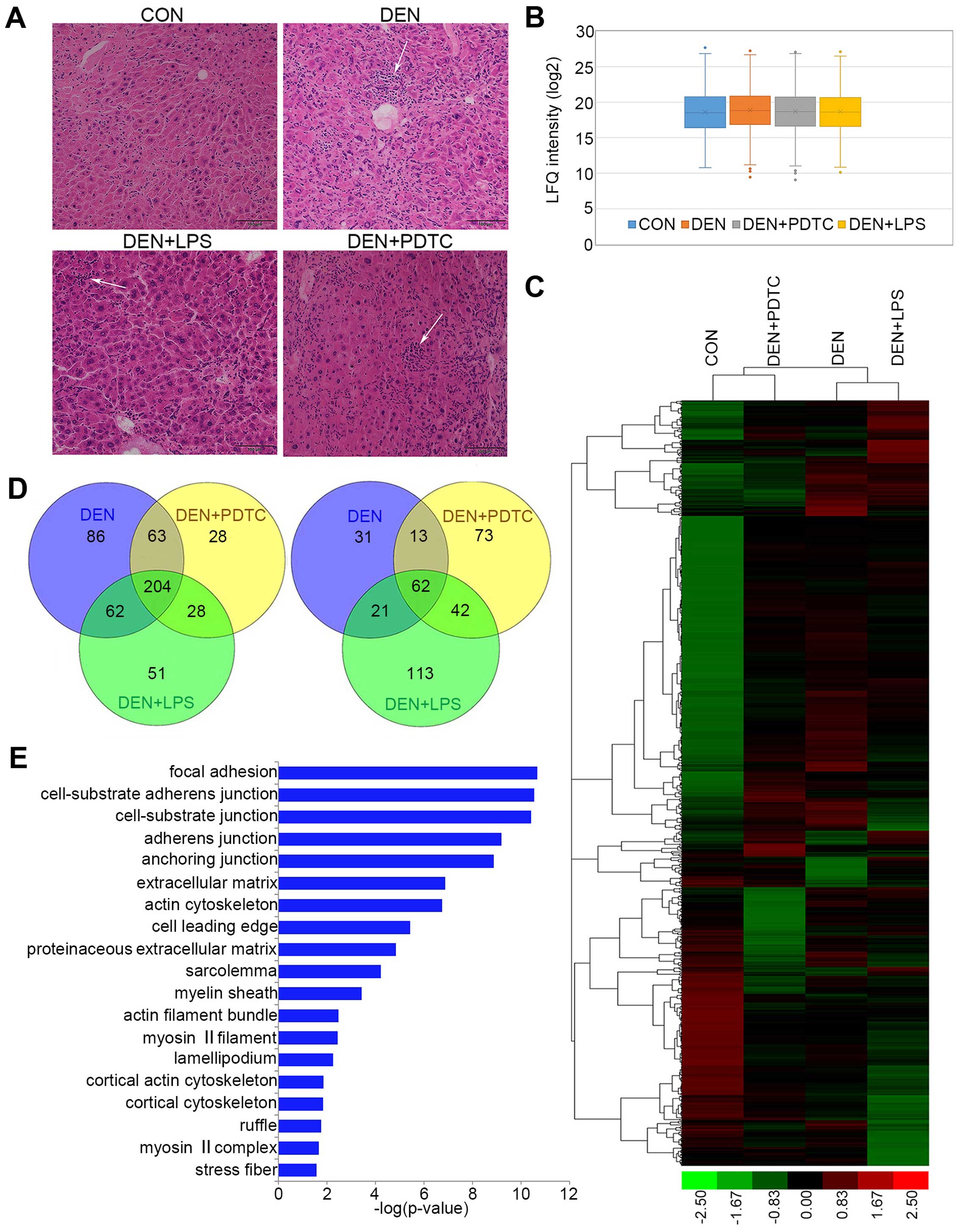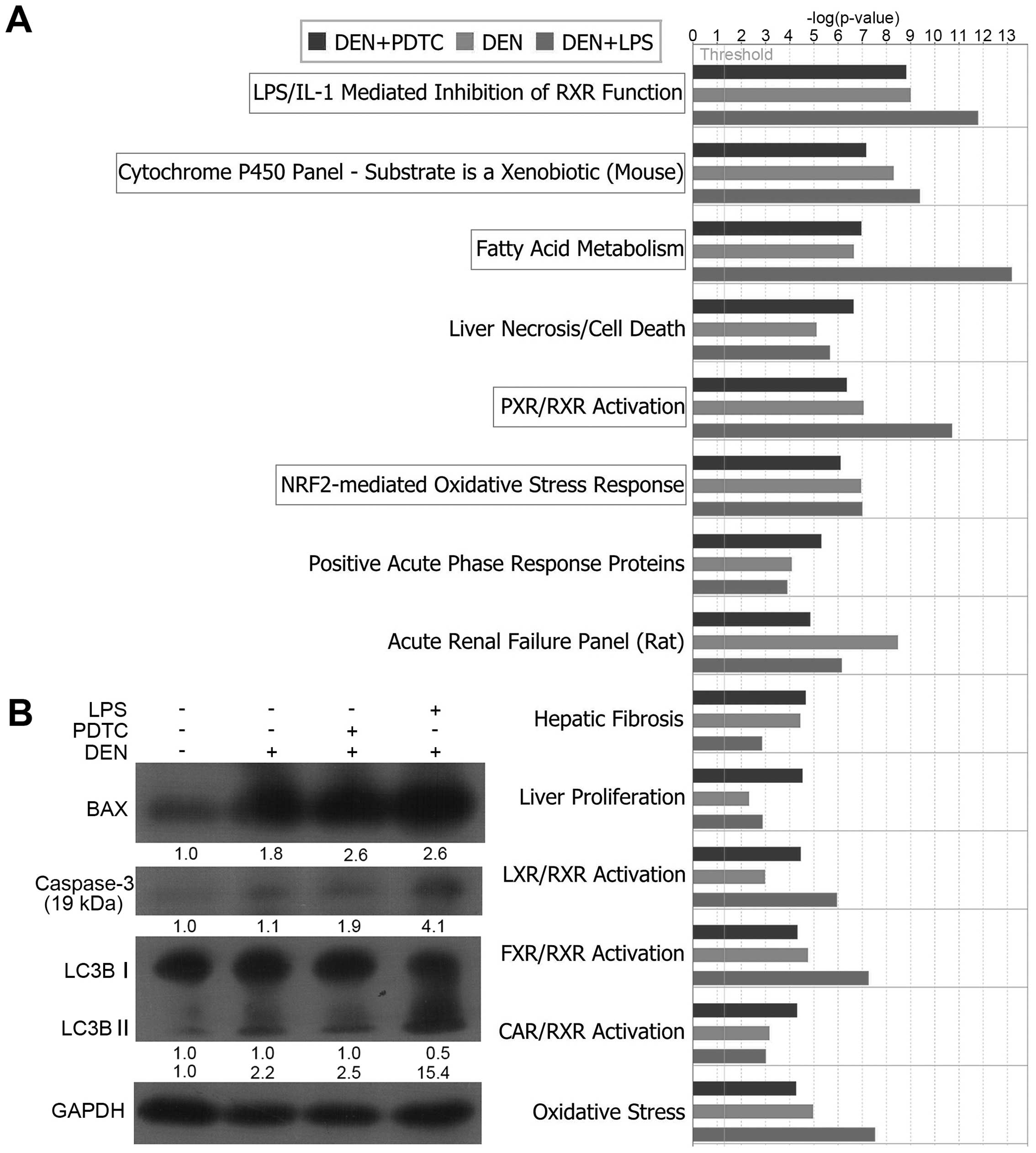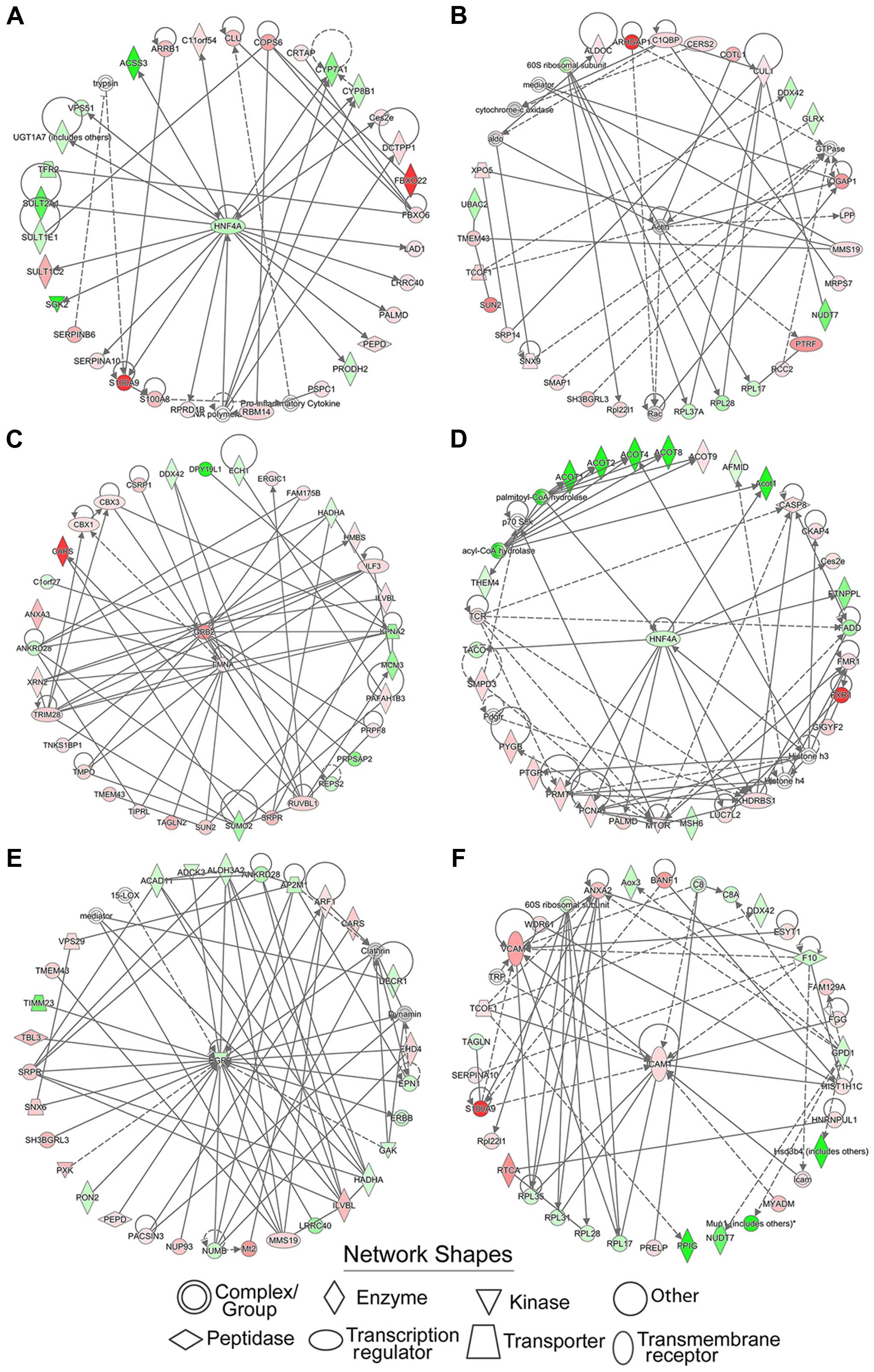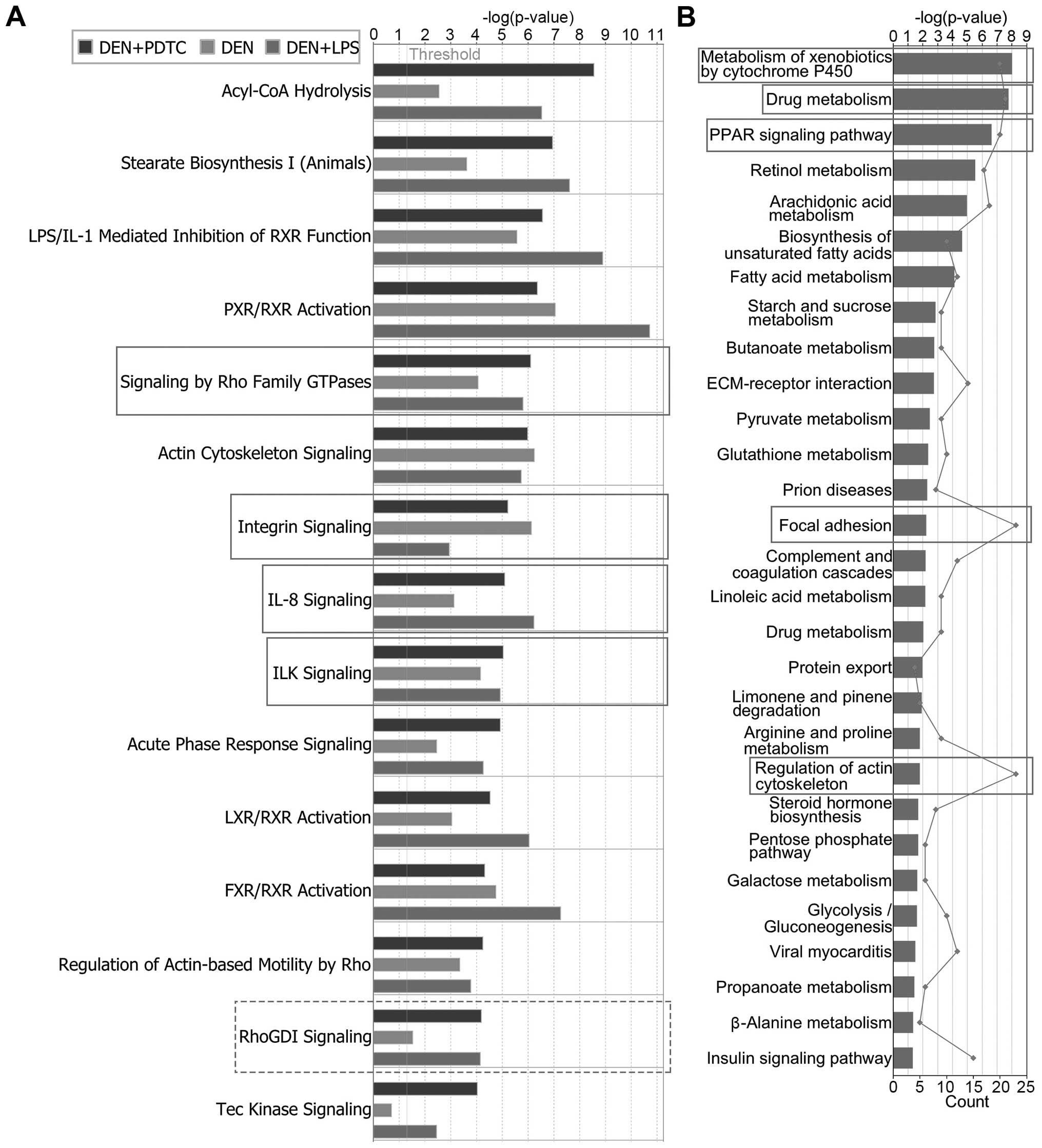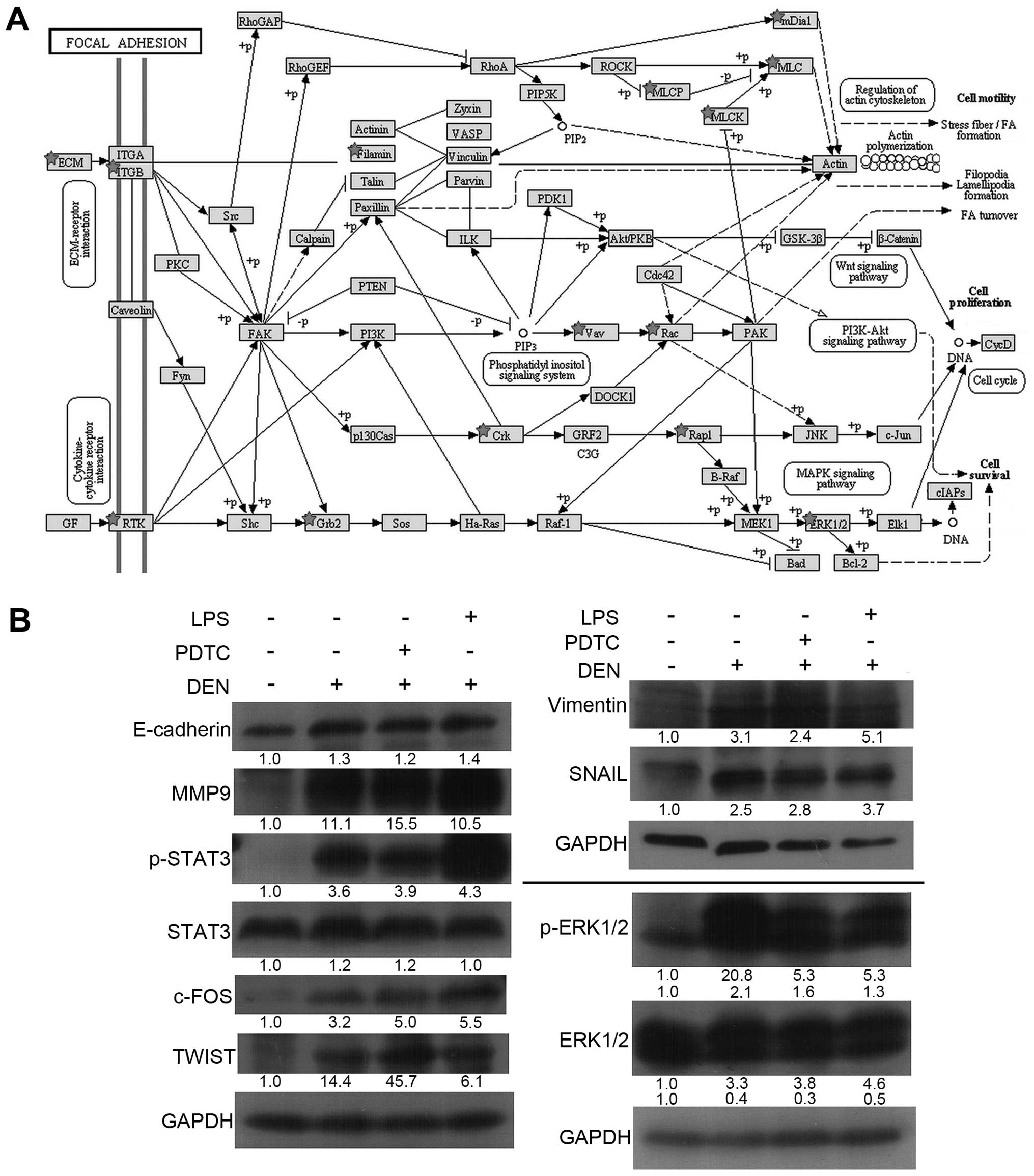|
1
|
Karin M: Nuclear factor-kappaB in cancer
development and progression. Nature. 441:431–436. 2006. View Article : Google Scholar : PubMed/NCBI
|
|
2
|
Kuper H, Adami HO and Trichopoulos D:
Infections as a major preventable cause of human cancer. J Intern
Med. 248:171–183. 2000. View Article : Google Scholar : PubMed/NCBI
|
|
3
|
Allavena P, Garlanda C, Borrello MG, Sica
A and Mantovani A: Pathways connecting inflammation and cancer.
Curr Opin Genet Dev. 18:3–10. 2008. View Article : Google Scholar : PubMed/NCBI
|
|
4
|
Nakagawa H and Maeda S: Inflammation- and
stress-related signaling pathways in hepatocarcinogenesis. World J
Gastroenterol. 18:4071–4081. 2012. View Article : Google Scholar : PubMed/NCBI
|
|
5
|
Balkwill F and Mantovani A: Inflammation
and cancer: Back to Virchow? Lancet. 357:539–545. 2001. View Article : Google Scholar : PubMed/NCBI
|
|
6
|
Markiewski MM, DeAngelis RA and Lambris
JD: Liver inflammation and regeneration: Two distinct biological
phenomena or parallel pathophysiologic processes? Mol Immunol.
43:45–56. 2006. View Article : Google Scholar
|
|
7
|
Connor JH, Weiser DC, Li S, Hallenbeck JM
and Shenolikar S: Growth arrest and DNA damage-inducible protein
GADD34 assembles a novel signaling complex containing protein
phosphatase 1 and inhibitor 1. Mol Cell Biol. 21:6841–6850. 2001.
View Article : Google Scholar : PubMed/NCBI
|
|
8
|
Poirier MC: Chemical-induced DNA damage
and human cancer risk. Discov Med. 14:283–288. 2012.PubMed/NCBI
|
|
9
|
Peng B, Liu F, Han R, Luo G, Cathopoulis
T, Lu K, Li X, Yang L, Liu GY, Cai JC, et al: Dynamic metabolic
change is indicative of inflammation-induced transformation of
hepatic cells. Int J Biochem Cell Biol. 66:45–58. 2015. View Article : Google Scholar : PubMed/NCBI
|
|
10
|
El-Serag HB and Rudolph KL: Hepatocellular
carcinoma: Epidemiology and molecular carcinogenesis.
Gastroenterology. 132:2557–2576. 2007. View Article : Google Scholar : PubMed/NCBI
|
|
11
|
Berasain C, Castillo J, Perugorria MJ,
Latasa MU, Prieto J and Avila MA: Inflammation and liver cancer:
New molecular links. Ann NY Acad Sci. 1155:206–221. 2009.
View Article : Google Scholar
|
|
12
|
Nikolaou K, Sarris M and Talianidis I:
Molecular pathways: The complex roles of inflammation pathways in
the development and treatment of liver cancer. Clin Cancer Res.
19:2810–2816. 2013. View Article : Google Scholar : PubMed/NCBI
|
|
13
|
Zhao XR, Gonzales N and Aronowski J:
Pleiotropic role of PPARγ in intracerebral hemorrhage: An intricate
system involving Nrf2, RXR, and NF-κB. CNS Neurosci Ther.
21:357–366. 2015. View Article : Google Scholar
|
|
14
|
Shan P, Pu J, Yuan A, Shen L, Shen L, Chai
D and He B: RXR agonists inhibit oxidative stress-induced apoptosis
in H9c2 rat ventricular cells. Biochem Biophys Res Commun.
375:628–633. 2008. View Article : Google Scholar : PubMed/NCBI
|
|
15
|
Chai D, Wang B, Shen L, Pu J, Zhang XK and
He B: RXR agonists inhibit high-glucose-induced oxidative stress by
repressing PKC activity in human endothelial cells. Free Radic Biol
Med. 44:1334–1347. 2008. View Article : Google Scholar : PubMed/NCBI
|
|
16
|
Elbrecht A, Chen Y, Cullinan CA, Hayes N,
Leibowitz M, Moller DE and Berger J: Molecular cloning, expression
and characterization of human peroxisome proliferator activated
receptors gamma 1 and gamma 2. Biochem Biophys Res Commun.
224:431–437. 1996. View Article : Google Scholar : PubMed/NCBI
|
|
17
|
Elchuri S, Naeemuddin M, Sharpe O,
Robinson WH and Huang TT: Identification of biomarkers associated
with the development of hepatocellular carcinoma in CuZn superoxide
dismutase deficient mice. Proteomics. 7:2121–2129. 2007. View Article : Google Scholar : PubMed/NCBI
|
|
18
|
Bell LN, Vuppalanchi R, Watkins PB,
Bonkovsky HL, Serrano J, Fontana RJ, Wang M, Rochon J and Chalasani
N; US Drug-Induced Liver Injury Network (DILIN) Research Group.
Serum proteomic profiling in patients with drug-induced liver
injury. Aliment Pharmacol Ther. 35:600–612. 2012. View Article : Google Scholar : PubMed/NCBI
|
|
19
|
Hatziapostolou M, Polytarchou C, Aggelidou
E, Drakaki A, Poultsides GA, Jaeger SA, Ogata H, Karin M, Struhl K,
Hadzopoulou-Cladaras M, et al: An HNF4α-miRNA inflammatory feedback
circuit regulates hepatocellular oncogenesis. Cell. 147:1233–1247.
2011. View Article : Google Scholar : PubMed/NCBI
|
|
20
|
Babeu JP and Boudreau F: Hepatocyte
nuclear factor 4-alpha involvement in liver and intestinal
inflammatory networks. World J Gastroenterol. 20:22–30. 2014.
View Article : Google Scholar : PubMed/NCBI
|
|
21
|
Zeisberg M, Yang C, Martino M, Duncan MB,
Rieder F, Tanjore H and Kalluri R: Fibroblasts derive from
hepatocytes in liver fibrosis via epithelial to mesenchymal
transition. J Biol Chem. 282:23337–23347. 2007. View Article : Google Scholar : PubMed/NCBI
|
|
22
|
Rygiel KA, Robertson H, Marshall HL,
Pekalski M, Zhao L, Booth TA, Jones DEJ, Burt AD and Kirby JA:
Epithelial-mesenchymal transition contributes to portal tract
fibrogenesis during human chronic liver disease. Lab Invest.
88:112–123. 2008. View Article : Google Scholar
|
|
23
|
Figel S and Gelman IH: Focal adhesion
kinase controls prostate cancer progression via intrinsic kinase
and scaffolding functions. Anticancer Agents Med Chem. 11:607–616.
2011. View Article : Google Scholar : PubMed/NCBI
|
|
24
|
Cortez V, Nair BC, Chakravarty D and
Vadlamudi RK: Integrin-linked kinase 1: Role in hormonal cancer
progression. Front Biosci (Schol Ed). 3:788–796. 2011.
|
|
25
|
Ke AW, Shi GM, Zhou J, Huang XY, Shi YH,
Ding ZB, Wang XY, Devbhandari RP and Fan J: CD151 amplifies
signaling by integrin α6β1 to PI3K and induces the
epithelial-mesenchymal transition in HCC cells. Gastroenterology.
140:1629–41.e15. 2011. View Article : Google Scholar
|
|
26
|
Gil D, Ciołczyk-Wierzbicka D,
Dulińska-Litewka J, Zwawa K, McCubrey JA and Laidler P: The
mechanism of contribution of integrin linked kinase (ILK) to
epithelial-mesenchymal transition (EMT). Adv Enzyme Regul.
51:195–207. 2011. View Article : Google Scholar
|
|
27
|
Hwangbo C, Kim J, Lee JJ and Lee JH:
Activation of the integrin effector kinase focal adhesion kinase in
cancer cells is regulated by crosstalk between protein kinase
Calpha and the PDZ adapter protein mda-9/Syntenin. Cancer Res.
70:1645–1655. 2010. View Article : Google Scholar : PubMed/NCBI
|
|
28
|
Fuse T, Kanai Y, Kanai-Azuma M, Suzuki M,
Nakamura K, Mori H, Hayashi Y and Mishina M: Conditional activation
of RhoA suppresses the epithelial to mesenchymal transition at the
primitive streak during mouse gastrulation. Biochem Biophys Res
Commun. 318:665–672. 2004. View Article : Google Scholar : PubMed/NCBI
|















